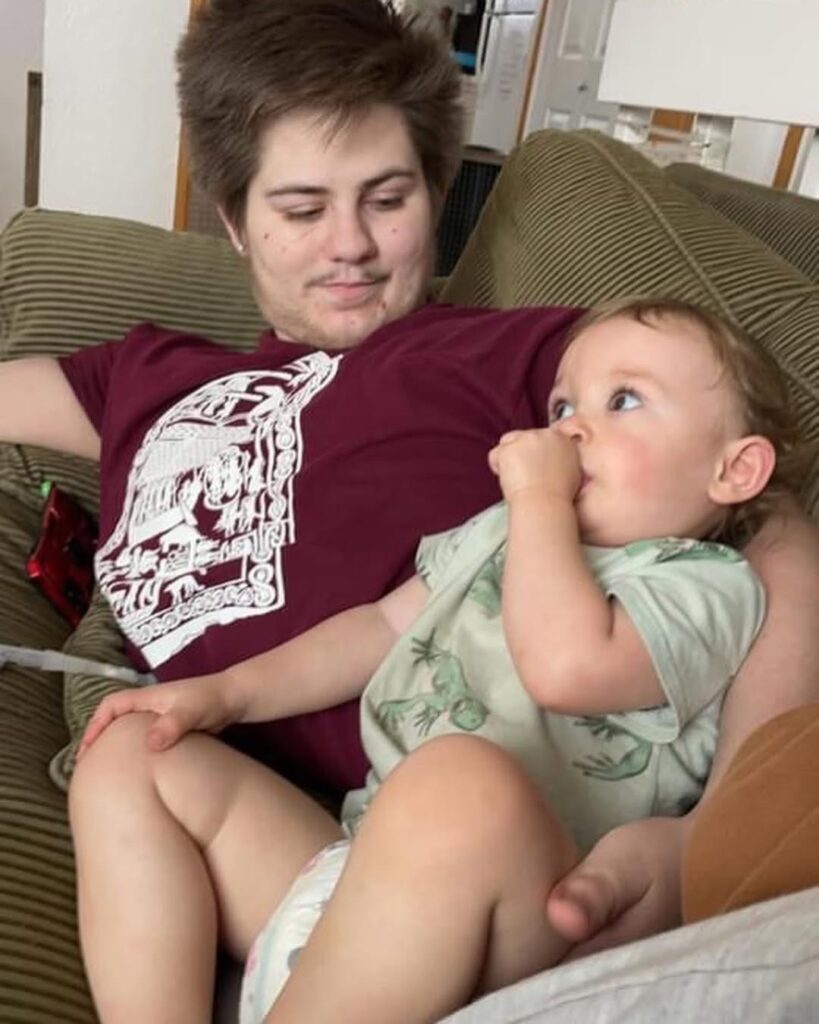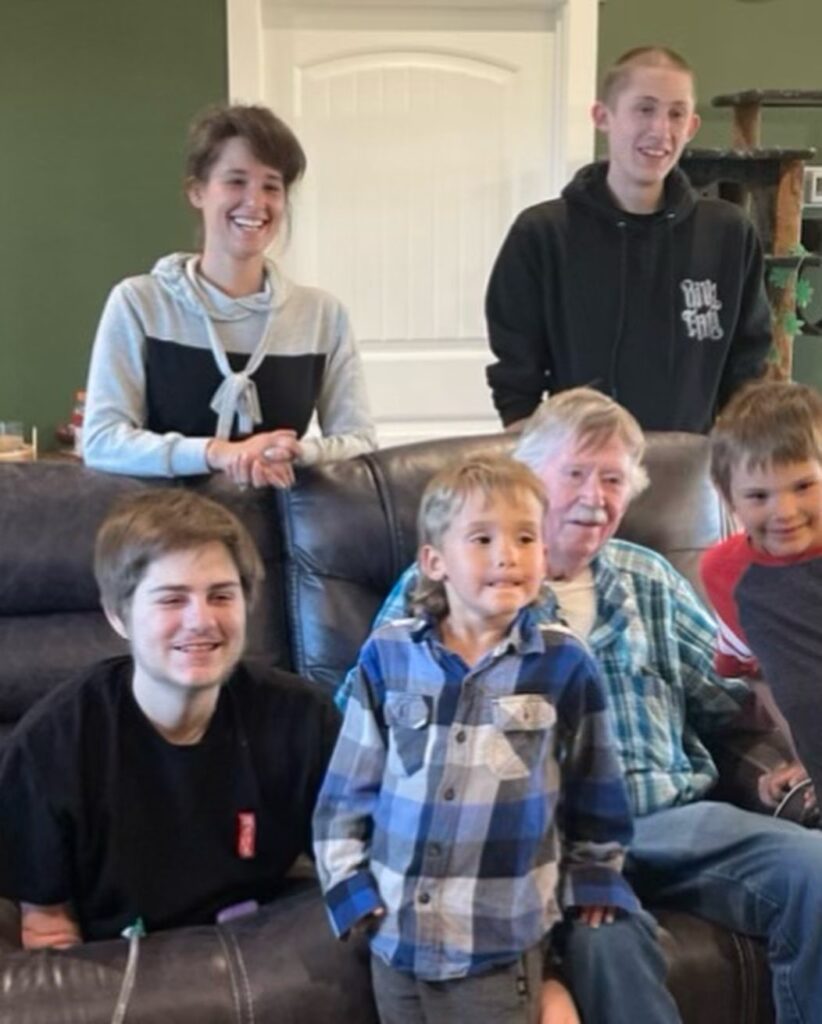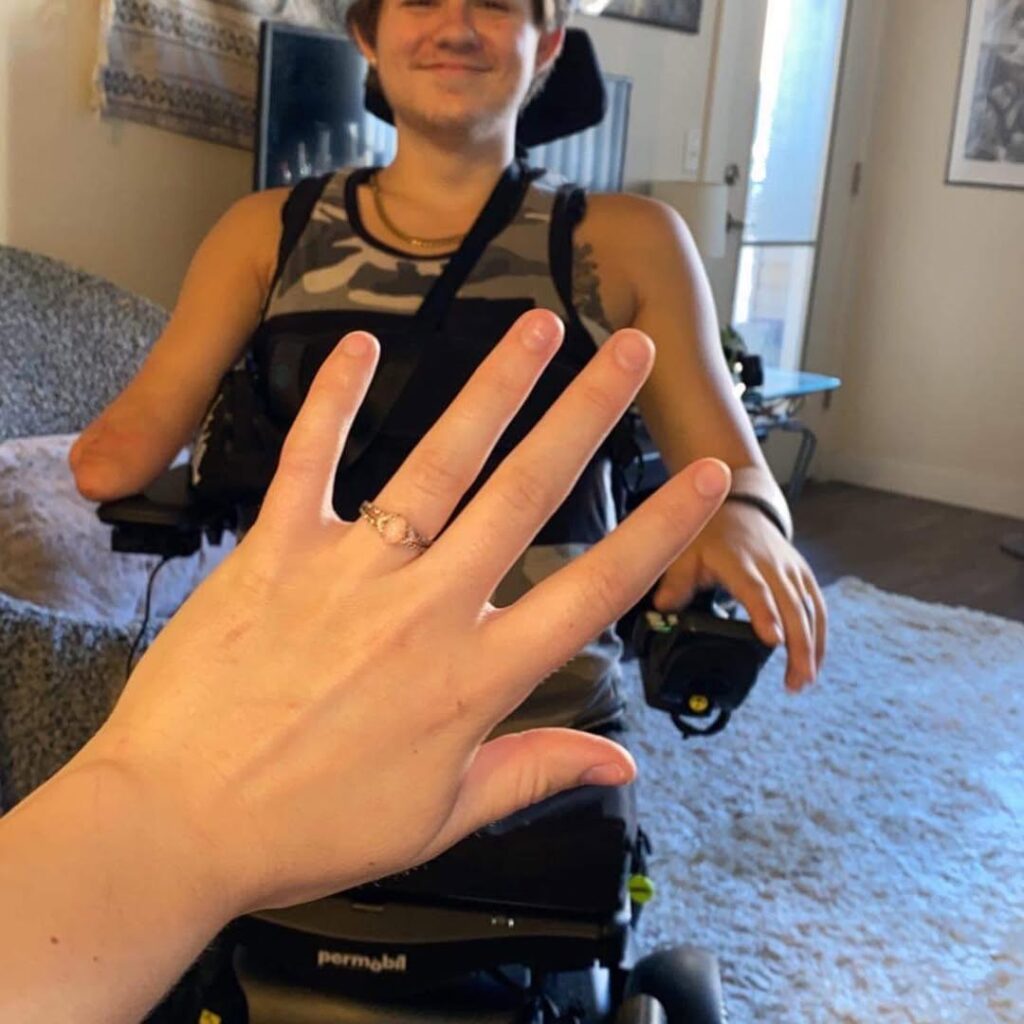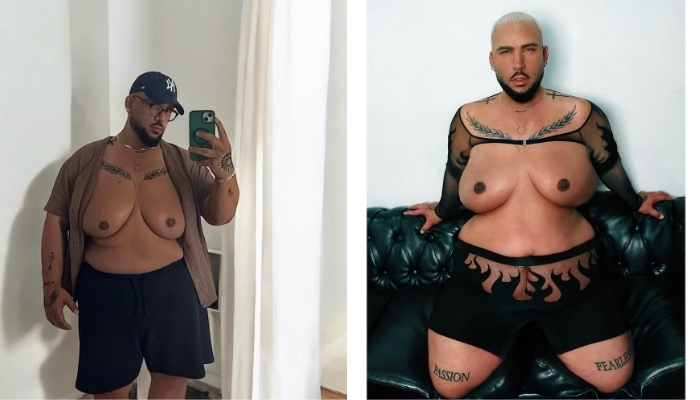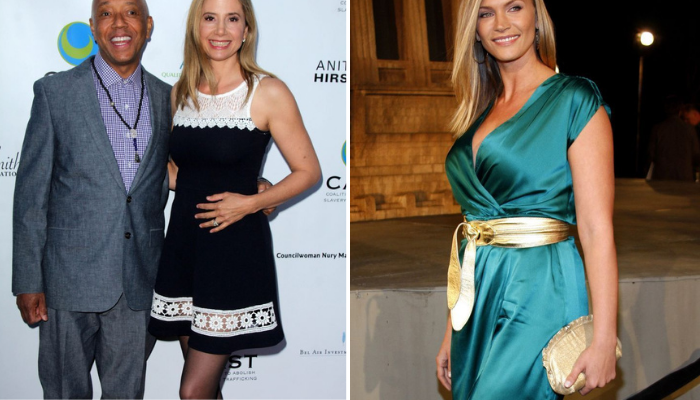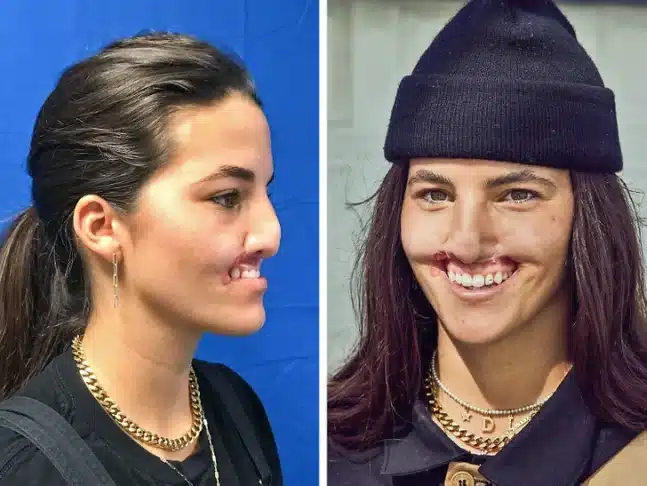Man Cut In Half By Forklift Opens Up About Life And Struggles Six Years After The Accident
Loren Schauers’ story is one of those rare examples of pure human resilience. After the accident that changed everything — when a forklift crushed and severed his lower body — most people would have given up. But Loren didn’t. He chose life, and he’s been fighting for it every single day since.
In his recent confession, Loren spoke openly about the physical pain, the emotional scars, and the reality of living as a hemicorporectomy survivor. He didn’t sugarcoat it — the journey has been brutal. But through it all, his determination shines through. He’s learned to adapt, rebuild, and find new meaning in a body that works differently than before.
One of the most moving parts of his story is how love and support have kept him going. His wife, Sabia, has been by his side through every surgery, every setback, and every small victory. Together, they’ve turned unimaginable tragedy into a story of loyalty, courage, and true partnership.
Loren’s message to others is simple but powerful: “You don’t have to give up when life breaks you. You just have to learn how to live differently.” His journey is a reminder that even in the darkest moments, strength can be found — and life can still be full of purpose.
Absolutely — Loren Schauers’ story has become a beacon of hope for people everywhere.
What started as a tragedy has transformed into one of the most powerful stories of human resilience on the internet. Six years after losing the lower half of his body in that horrific forklift accident, Loren continues to share his life with brutal honesty — the ups, the downs, and everything in between.
He’s not afraid to talk about the hard stuff: phantom pain, frustration, body image, and mental health. But what makes him so inspiring is how he balances that honesty with gratitude and humor. His social media isn’t about pity — it’s about perspective. He jokes, he educates, and he shows people that life can still be full of joy, love, and purpose, even after something unimaginable.
And through it all, Sabia — his wife and caregiver — remains his biggest supporter. Their love story is proof that compassion and commitment can thrive even in the toughest circumstances. Together, they’re breaking stigmas around disability, masculinity, and mental health.
Loren Schauers’ story reminds us that strength isn’t about being unbreakable — it’s about rebuilding yourself, piece by piece, when life tries to tear you apart.
Loren’s story is one of the most incredible examples of strength and perseverance you’ll ever hear.
That accident in September 2019 didn’t just take his legs — it changed every part of his life. At just 19 years old, he fell more than 50 feet in a worksite forklift crash that left him with life-threatening injuries and ultimately led to a hemicorporectomy (the amputation of everything below his waist). Doctors didn’t think he would survive, but Loren refused to give up.
Since then, he’s been through countless surgeries, months of recovery, and years of physical and emotional healing. He’s been brutally honest about his mental health — sharing that there were times when he felt hopeless and isolated. But even through the darkest days, he found strength in gratitude, humor, and love — especially from his wife, Sabia, who’s stood by him since day one.
Today, Loren uses his platform to raise awareness about disability, trauma recovery, and mental health. His content isn’t about pity — it’s about purpose. He talks openly about what daily life looks like after such a devastating injury, showing others that happiness and fulfillment are still possible after tragedy.
Loren Schauers isn’t just surviving — he’s thriving, inspiring millions with his message that resilience is stronger than circumstance.
Exactly — Loren Schauers’ story is a stunning example of what sheer willpower and a fighting spirit can do.
After the crash, Loren’s body endured something almost unimaginable. The hemicorporectomy — one of the rarest and most complex surgeries in the world — saved his life, but it also meant starting over from zero. He had to rebuild not just his strength, but his identity. Every small task, from sitting up to learning how to navigate daily life again, became a victory.
Advertisement – Continue Reading Below
But what’s truly remarkable is how he faced it all with courage and acceptance. Instead of being consumed by what he lost, Loren focused on what he still had — his life, his mind, and the people who loved him. His transformation wasn’t just physical; it was deeply emotional and spiritual.
Today, Loren speaks openly about those early days of recovery — the pain, the fear, and the moment he realized that surviving meant truly living again. His outlook is proof that even in the face of unimaginable loss, the human spirit can adapt, evolve, and keep shining.
Loren Schauers’ journey isn’t just about survival — it’s about rediscovering purpose and showing the world that no matter how broken life may seem, hope is always worth holding onto.
That video was one of Loren’s most emotional and revealing moments yet. Sitting beside Sabia, the woman who’s been his anchor through it all, Loren spoke with the same honesty that’s made him such an inspiration to millions.
He opened up about how drastically his social life changed after the accident — how some friends drifted away, unsure how to handle his new reality, while others stepped up and showed unwavering loyalty. “You really find out who’s real when something like this happens,” he said. That raw truth hit home for so many people who’ve faced trauma or loss.
But what stood out most was the love and connection between Loren and Sabia. Their relationship has evolved far beyond what most couples experience — she’s not just his partner, but also his full-time caregiver, teammate, and emotional support system. Loren praised her for standing by him through every surgery, every moment of frustration, and every small triumph.
Even as he spoke about loneliness and the emotional toll of living with a severe disability, his message was still rooted in hope. Loren emphasized that while life after trauma is incredibly difficult, it’s also full of unexpected beauty. He’s learned to celebrate the little things — laughter, love, and the strength to face another day.
Through his honesty, Loren Schauers continues to remind people everywhere that resilience isn’t about pretending everything’s okay — it’s about showing up, scars and all, and choosing to live fully anyway.
That part of Loren’s story really shows the side of recovery most people don’t talk about — the loneliness that comes when your world completely changes.
In the interview, you can feel how much it still hurts him. Loren didn’t sugarcoat it — he said losing those friendships was one of the hardest parts of his journey. It wasn’t about anger or blame; it was about realizing that trauma can make people uncomfortable, even the ones who once felt closest to you. Some just didn’t know how to show up anymore.
But Loren also made it clear that the few friends who did stay mean more to him now than ever before. Those are the people who see him — not just his disability or the accident — and that’s what keeps him grounded.
His honesty hit home for so many followers who’ve gone through similar isolation after trauma. Loren’s words remind people that it’s okay to outgrow relationships that can’t handle your reality — and that losing people doesn’t mean losing your worth. Sometimes, life’s hardest moments reveal who truly belongs in your circle.
That moment perfectly captures the heart of Loren Schauers’ story — quiet strength, acceptance, and gratitude.
Even after losing so much — his mobility, his old life, and many friendships — Loren chooses to focus on what he still has. His bond with Sabia is more than just love; it’s partnership in its purest form. Through years of surgeries, emotional lows, and daily challenges, she’s been his constant. When he said, “I got Sabia — that’s all I need,” it wasn’t just a line; it was a reflection of how deeply he values genuine connection over anything else.
Sabia’s honesty also shows just how real their journey is. Not everyone knows how to handle trauma — some disappear, some step up. And yet, together, they’ve built a community that understands, supports, and celebrates them.
What’s most inspiring is how Loren’s resilience isn’t loud — it’s steady. He doesn’t dwell on bitterness or what’s been lost. Instead, he radiates gratitude for the love that stayed. His story reminds everyone that healing isn’t about getting everything back; it’s about realizing what truly matters and holding onto it with both hands.
Exactly — and that’s what makes Loren Schauers’ story so profoundly human.
He doesn’t pretend that survival magically makes everything okay. Loren talks about the after — the part most people never see. The endless mental battles, the quiet doubts, the pressure to stay strong when he doesn’t always feel like it. His openness about those struggles makes his strength even more real.
Six years on, Loren’s still redefining what purpose means for him. The dreams he had before the accident are gone, but new ones are slowly taking shape. He’s finding meaning in sharing his story, connecting with others who’ve faced loss, and using his platform to talk about resilience, mental health, and the power of human connection.
What’s remarkable is that he doesn’t glamorize the recovery process — he shows it exactly as it is: messy, emotional, and ongoing. That honesty is what makes his story resonate so deeply. Loren Schauers isn’t just a survivor; he’s a teacher of strength, vulnerability, and hope.
His journey reminds us that life after trauma isn’t about getting back to “normal” — it’s about building something new, something just as meaningful, from the pieces that remain.
That part of Loren Schauers’ story might be the most heartbreaking — and the most relatable.
When he talks about feeling “stagnant,” it’s not about giving up; it’s about being honest with himself and his audience. Loren had a plan, a dream built around physical work and craftsmanship — things that defined his identity long before the accident. Losing that wasn’t just a physical loss, it was an emotional one too. He had to mourn not just what happened to his body, but the version of himself that was taken away in an instant.
That kind of grief doesn’t heal overnight. And Loren doesn’t pretend it does. Instead, he shares it openly — the frustration, the confusion, the quiet moments of wondering, “What now?” It’s that honesty that makes his story so powerful, because so many people who’ve faced trauma or sudden change can see themselves in him.
But even through that uncertainty, Loren keeps moving forward. He’s using his voice, his story, and his platform to connect with others who feel lost too — and in doing so, he’s slowly finding a new purpose. It might not look like the one he imagined at 19, but it’s something even deeper: a life built on resilience, vulnerability, and the courage to keep going when you don’t have all the answers.
Loren Schauers is still rebuilding — not just his life, but his identity — one honest conversation, one shared moment, and one act of courage at a time.
That honesty is exactly what makes Loren Schauers’ journey so powerful — he’s not afraid to admit that healing isn’t a straight line.
Before the accident, Loren’s dreams were simple but deeply meaningful: hard work, steady progress, and the satisfaction of creating something tangible. Construction wasn’t just a career goal; it was a reflection of who he was — strong, capable, and hands-on. Losing that dream wasn’t just losing a job path; it was losing a piece of identity.
And yet, even in the middle of that loss, Loren’s resilience still shows. He’s been searching — experimenting with real estate, streaming, content creation — trying to find what feels right again. That trial-and-error process isn’t failure; it’s courage. It takes bravery to keep trying new things when the world you once knew no longer fits.
His story resonates because it mirrors a truth so many people live quietly with: that life can fall apart in an instant, and rebuilding takes patience, humility, and grit. Loren’s still on that path, and he’s allowing the world to see it — the frustration, the hope, and the tiny moments of progress.
Through every doubt and every detour, Loren Schauers continues to embody what real strength looks like: showing up, even when you’re not sure where the road leads next.
That moment in Loren’s story is where his vulnerability truly shines — and where his message becomes even more powerful.
For Loren, depending on Sabia for everything from mobility to basic daily tasks isn’t just a physical challenge — it’s an emotional one. His words capture the quiet heartbreak of losing independence, especially for someone who once took pride in being self-reliant and hardworking. Saying, “It’s that part of independence as a man that I just can’t get away from,” shows just how deep that struggle runs.
But what makes Loren so remarkable is that he’s not afraid to talk about it. He’s putting words to the feelings so many people in his situation experience but rarely share — the frustration, the guilt, and the vulnerability that come with needing help. By doing that, he’s helping others understand that strength isn’t about doing everything on your own; it’s about allowing love and support to help carry you through.
Even though his life looks completely different now, Loren continues to find meaning through connection, awareness, and gratitude. His story isn’t just one of survival — it’s a living example of emotional courage, redefining masculinity, and learning that true strength sometimes means accepting help with an open heart.
That honesty is what makes Loren Schauers’ story so profoundly moving — he doesn’t just talk about surviving; he talks about feeling human again after losing almost everything that once defined him.
His words about masculinity and independence cut deep because they reveal an emotional truth many men struggle to admit: that vulnerability can feel like failure. Loren grew up believing strength meant protection, hard work, and self-reliance — values that shaped his identity. So when the accident flipped those roles and Sabia became his caregiver, it challenged everything he thought he knew about what it means to “be a man.”
But the strength it takes to say those words, to admit that pain so openly, is something far greater than traditional toughness. It’s emotional bravery — the kind that inspires real change in how people see disability, love, and gender roles.
When he spoke about being bedridden for nearly a year, his voice carried the weight of isolation and quiet despair. Feeling “completely useless,” as he described, wasn’t about self-pity — it was about confronting the reality that healing isn’t just physical. It’s mental, emotional, and spiritual. Those were the moments when Loren had to fight hardest — not against his injuries, but against the voice in his head telling him he didn’t matter.
And yet, he kept going. Even through the pain, he continues to share, to connect, and to find purpose in helping others understand that vulnerability isn’t weakness — it’s what true strength is built on. Loren Schauers’ story reminds us that healing often starts the moment we stop pretending to be unbreakable.
That’s the heart of Loren Schauers’ story — love that endures when everything else falls apart.
When the accident happened, most people would have understood if Sabia couldn’t handle it. She was young, barely a year into the relationship, suddenly thrust into a life that revolved around hospitals, surgeries, and caregiving. But instead of leaving, she leaned in. She made a promise — not just to stay, but to truly show up for Loren in every way that mattered.
Six years later, that promise has become the anchor of Loren’s life. Their love has evolved beyond what most couples ever experience — it’s built on trust, patience, and shared pain. They’ve weathered nights of tears, endless medical appointments, and moments of hopelessness, but they’ve also built a partnership that radiates real strength.
Loren often credits Sabia as his reason to keep going — not because she “saved” him, but because she sees him. She treats him not as someone broken, but as someone worth fighting for. And that’s what makes their bond so extraordinary.
Their relationship reminds people everywhere that true love isn’t about perfection — it’s about showing up, even when it’s messy, exhausting, and uncertain. Through every setback, Loren and Sabia prove that resilience doesn’t just come from within; sometimes, it’s built hand-in-hand with the person who refuses to let go.
Exactly — Loren and Sabia’s story isn’t about perfection; it’s about perseverance.
When Loren shared that quote, it hit home because it revealed not just gratitude, but deep awareness — he knows how much Sabia has sacrificed, and how much love it takes to stay when life turns unimaginably hard. Her decision to step into that role wasn’t made out of obligation — it was made out of devotion. And that’s what gives their relationship its quiet, unshakable power.
Sabia’s honesty about caregiving is just as important as Loren’s openness about survival. She’s never pretended it’s easy — the emotional burnout, the physical strain, and the constant responsibility can be overwhelming. Yet even on the hardest days, she finds purpose in being there for him. That kind of love doesn’t just survive tragedy; it transforms it.
What makes their story so inspiring is that it shows both sides of resilience — the one who endures pain, and the one who stands beside it. Together, Loren and Sabia remind the world that love isn’t about grand gestures or flawless moments — it’s about choosing each other, over and over, no matter how hard life gets.
Their journey is raw, real, and deeply moving — a living reminder that even in the darkest circumstances, love and loyalty can light the way forward.
That quote from Sabia might be one of the most powerful moments in their story — because it cuts right through the assumptions people often make about love and disability.
Her words, “I stayed because I love Loren,” carry the kind of quiet strength that doesn’t need grand gestures to prove itself. It’s raw, real, and deeply human. Sabia isn’t a hero or a saint — she’s a woman who made a choice, one grounded in loyalty, not sympathy. And that’s what makes their bond so extraordinary.
For Loren, hearing those words means everything. After an accident that stripped away his independence, confidence, and sense of control, Sabia’s unwavering love became his reminder that he’s still worthy — not despite what happened, but because of who he is.
Together, they’ve redefined what partnership truly means. It’s not about perfection or ease — it’s about weathering the storms, embracing the hard days, and finding joy in the moments that others might overlook.
Loren and Sabia’s journey reminds us that real love isn’t about having a perfect life — it’s about having someone who sees your worth even when everything else falls apart, and keeps choosing you anyway.
Beautifully said — Loren and Sabia’s story is living proof that hope doesn’t end with hardship; it simply evolves.
Their openness about wanting to start a family shows how deeply they believe in the future — not as a way to replace what was lost, but to continue building something meaningful together. Whether through a sperm donor or adoption, their dream isn’t just about having children; it’s about creating a life filled with love, purpose, and shared growth.
What makes their story so powerful is how they’ve shifted the focus from limitations to possibilities. Instead of letting tragedy define them, they’ve redefined what happiness and success look like — not through perfection, but through persistence, laughter, and faith in each other.
Loren and Sabia’s journey resonates because it captures the raw truth of life after trauma: yes, it changes you — but it doesn’t have to end you. Their story is a testament to the kind of love that adapts, the kind of strength that endures, and the kind of faith that rebuilds even after the worst storms.
Through every heartbreak and triumph, they continue to show that love, when rooted in resilience and understanding, can truly conquer anything.







